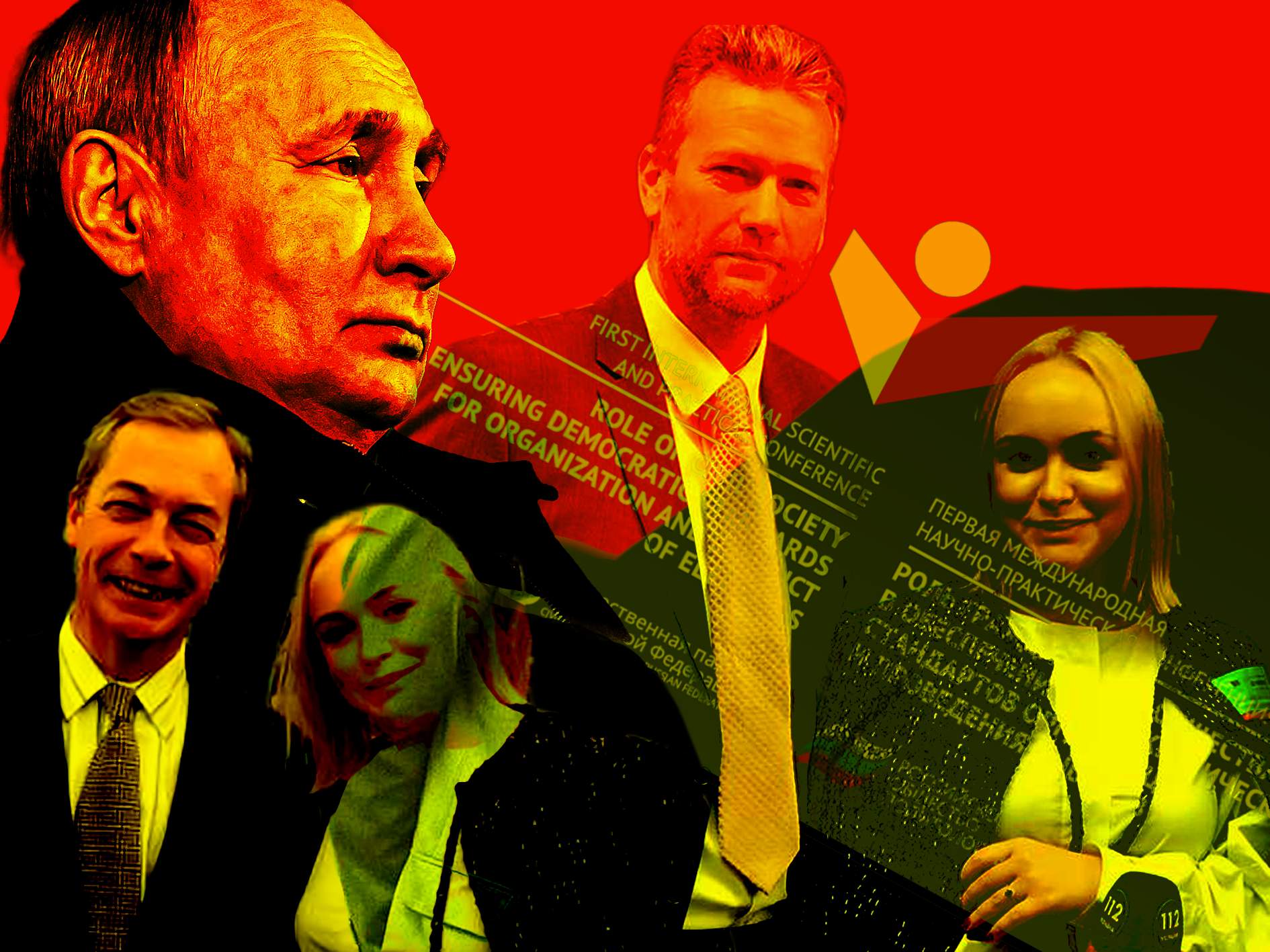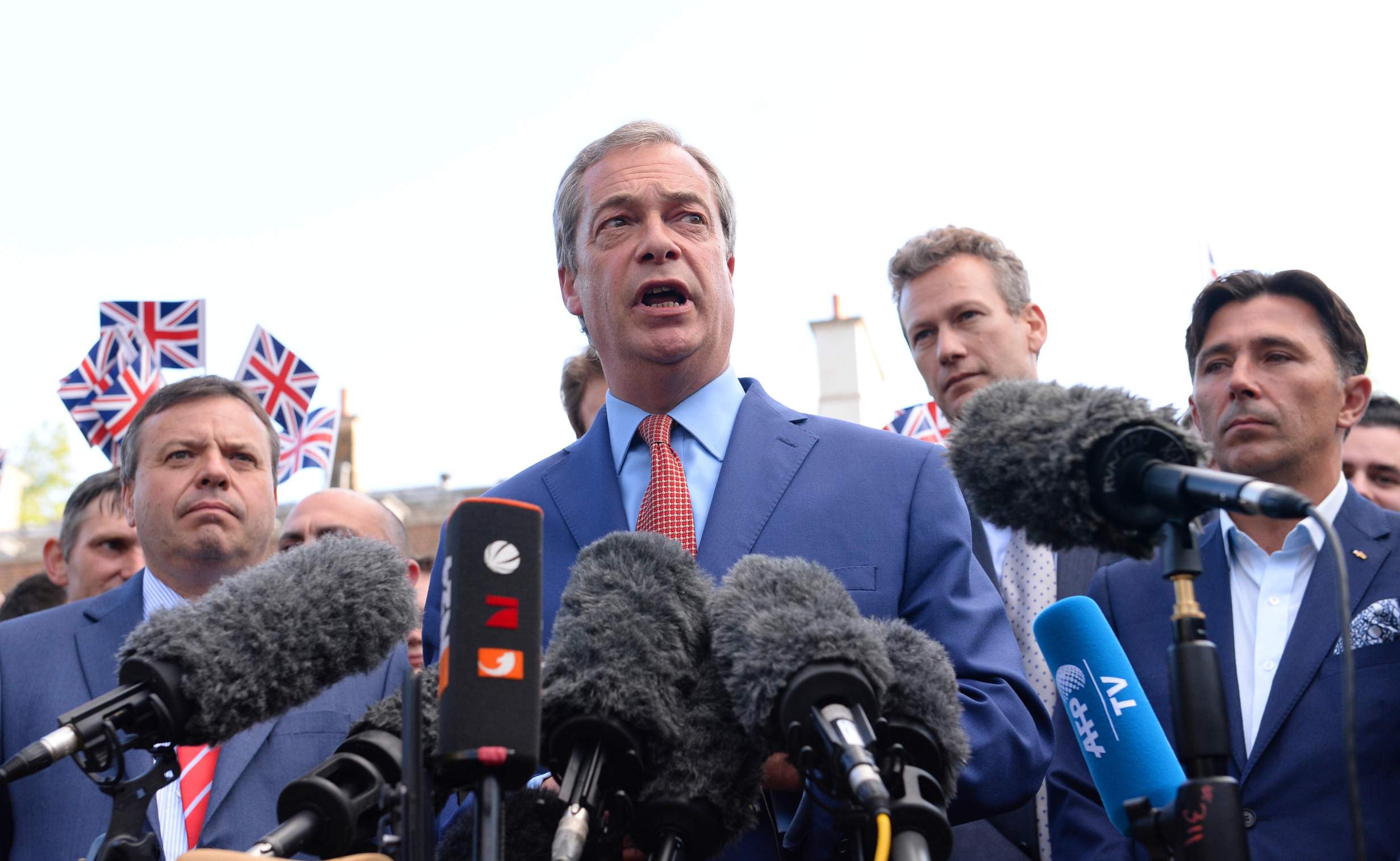
Read our Monthly Magazine
And support our mission to provide fearless stories about and outside the media system
Former UKIP and Brexit Party MEP Nathan Gill was sentenced at the Old Bailey on Friday to ten and a half years in prison, after pleading guilty to taking bribes to take part in a pro-Russian influence campaign.
Judge Mrs Justice Cheema-Grubb said the “corrosive damage to public life” caused by Gill’s actions would be enduring.
“Your misconduct has ramifications far beyond personal honor which is now irretrievably damaged,” she told Gill.
“It erodes public confidence in democracy when politicians succumb to financial inducement, the public can no longer rely on the veracity of political debate, which may be tainted by disinformation.”
The sentence sets a clear legal benchmark – leaving the way clear for the UK Parliament to finally hold a much-needed inquiry into Kremlin meddling in domestic affairs.
In the UK, this inquiry cannot help but look at events surrounding the EU Referendum itself as a major intervention by the Kremlin.
Nathan Gill – one of Farage’s closest confidantes in UKIP and the Brexit Party and a leading Reform UK figure in Wales – was convicted for eight counts of bribery, covering payments between December 2018 and July 2019 in return for statements and media interventions that reflected the Kremlin’s line on Ukraine.
The bribes occurred during a turbulent period after Prime Minister Theresa May had called out Putin in Lord Mayor’s Banquet speech in late 2017 — “we know what you’re doing” — for election interference, information warfare, hybrid ops after the invasion of Eastern Ukraine and annexation of Crimea.
The Kremlin had responded by attempting to assassinate the Russian defector Sergei Skripal in Salisbury with the deadly nerve agent Novichok, which ended up killing a local resident Dawn Sturgess.
Putin’s exasperation at the Brexit stalemate in Parliament dominates his end of year press conference in Moscow, during which he complains that the “will of the people” is not being enacted, and making an explicit comparison with Donald Trump’s election the same year: They don’t want to recognise [Trump’s] victory… It’s the same in Britain: Brexit happened, but nobody wants to implement it.”
“It is in this context of Brexit deadlock and mounting Anglo-Russian tensions that Gill starts receiving WhatsApp messages and payments from Oleg Voloshyn.
Oleg Voloshyn and the Medvedchuk Network

Gill’s conviction creates a documented, criminal link between a British Eurosceptic MEP and a pro-Kremlin influence channel.
However, what is often under-reported is how closely Gill’s paymaster Oleg (Oleh) Voloshyn was connected to the most important Russian power networks around Viktor Medvedchuk, Dmitry Medvedev and, ultimately, Vladimir Putin.
On 20 January 2022, the US Treasury sanctioned Oleg (Oleh) Voloshyn as one of four pro-Kremlin Ukrainians “engaged in Russian government-directed influence activities” against Ukraine, working with Russian intelligence-linked actors. He is named in the press release.
In May 2025, the EU Council added Voloshyn to its sanctions list for “Russian hybrid threats”, alongside Viktor Medvedchuk and media executive Artem Marchevskyi, describing how Medvedchuk, “through his associates Artem Marchevskyi and Oleg Voloshin”, used media platforms to disseminate Russian state narratives and interfere in European politics.
Apart from his media activities, Voloshyn was an MP pro Russian political party ‘For Life’ led by Viktor Medvedchuk.
Medvedchuk’s proximity to Putin cannot be underestimated. The Russian President is the godfather of his daughter and in evidence to the UK Parliament, political scientist Taras Kuzio characterises Viktor Medvedchuk and gas oligarch Dmytro Firtash as “Putin’s representatives in Ukraine”, controlling TV channels and funding pro-Russian parties
By the summer of 2019, Medvedchuk was already being investigated by Ukrainian authorities and his TV stations suspended. After Nathan Gill hosted a roundtable for him that summer, Medvedchuk flew back to Russia the next day to meet President Putin and emphasise the support of MEPs for the Russian peace for Eastern Ukraine.
When Medvedchuk was finally indicted for treason by the government of the new Ukrainian President Volodymyr Zelensky in late 2019, this was reportedly the last straw for Putin who then went on to plan his special military operation — the full invasion of Ukraine in 2022.
While Voloshyn fled Ukraine to Belarus on the eve of the invasion, Medvedchuk was planning to welcome the invading Russian troops and set up a puppet government for Putin. He was captured when Russians failed to capture Kiev and was returned to Russia in exchange for no fewer than 215 Ukrainian prisoners of war.
The Broader European Picture
As the first European politician to be convicted of working for a Russian proxy, Gill’s case shines a spotlight on the Kremlin’s long campaign to influence and suborn politics across the continent.
Whether it had any impact the vote itself, Britain’s referendum on EU membership was directly a target of Russian influence operations, with a combination of classic media propaganda from RT and Sputnik, social media disinformation from Evgeny Prigozhin’s infamous ‘troll farms’ and — as former MI6 intelligence officer revealed to myself and Carole Cadwalladr in the Sergei and the Westminster Spy Ring podcast — direct financial support for Brexit coming into the campaign from Russian military intelligence, the GRU.
Even more important than severing the UK from the EU was Ukraine, which had rebelled against domination by ousting its President when he reneged on a promise to join the European Union.
Ukraine was the focus of Gill’s activities. He worked closely with a Polish activist and lobbyist Janusz Gabriel Niedźwiecki, a Polish activist and lobbyist who was arrested — but so far not prosecuted — on charges of spying for Russia. The Public Prosecutor alleged he had been “commissioned by people working for Russian intelligence” and tried to establish contact with politicians “including those working in the European Parliament”.
Gill had made at least four trips to Ukraine and Moldova in 2018 under Niedźwiecki’s auspices, speaking at parades and forums organised by pro-Russian separatists and Russian businessmen, with travel arranged via a Moscow travel agency. This predates the specific bribery charges heard in the Old Bailey.
The judge sentencing Gill said there was no evidence that the fellow MEPs he passed pro-Russian talking points to were aware of the payments made to him. However, the Metropolitan Police say investigations into other unspecified politicians are ongoing.
Meanwhile, despite fleeing Ukraine in 2022, Voloshyn and his partner Nadia Sass have still been active on Medvedchuk’s behalf, with the 2025 EU sanctions noting their new media operation the Voice of Europe — a key media hub — which EU sanctions documents describe as intervening in pro-Russian propaganda in Poland, Hungary, the Netherlands and Germany.
The German outlet t-online reports that Nadia Sass (Voloshyn’s wife) and Oleg Voloshyn were key intermediaries in November 2024 when they invited far right AfD politicians Ulrich Singer and Rainer Rothfuß to attend a “Brics-Europe” conference in Sochi, where they met former Russian president and current Security Council deputy chair Dmitry Medvedev — one of the most aggressive mouthpieces for the destruction of Ukraine.
ENJOYING THIS ARTICLE? HELP US TO PRODUCE MORE
Receive the monthly Byline Times newspaper and help to support fearless, independent journalism that breaks stories, shapes the agenda and holds power to account.
We’re not funded by a billionaire oligarch or an offshore hedge-fund. We rely on our readers to fund our journalism. If you like what we do, please subscribe.
Russia’s Wider Influence Operations
The continued activities of Nathan Gill’s paymaster Oleg Voloshyn reveal how right wing European politicians are moved through media companies and conferences into the orbit of both Medvedchuk and Medvedev – figures who sit very close to Putin in Russia’s political hierarchy.
But this is just one aspect of a longer and broader campaign of Russian outreach to Europe’s far-right and Eurosceptic parties using media payments and conferences as influence operations in the Kremlin’s doctrine of hybrid warfare.
Leaked Russian documents, reported by Follow the Money and summarised by The Investigative Desk and NL Times, show that since 2013 the Kremlin has systematically cultivated Gert Wilder’s Dutch PVV party as a useful partner in Europe.
Marine Le Pen’s party took a €9m loan in 2014 from First Czech Russian Bank, later transferred to Russian firm Aviazapchast and rescheduled to 2028; Reuters and others have tracked the restructuring and the party’s claim in 2023 that the loan was fully repaid.
After meeting the Russian Ambassador in London in 2013, then UKIP leader Farage made frequent paid appearances on the Russian state channel RT. His Leave EU campaign officials made many undisclosed visits to the Russian Embassy during the Brexit campaign of 2015-2016 during which they discussed gold and diamond privatisation deals.
Austria’s FPÖ and Italy’s Lega Nord signed formal agreements with Putin’s United Russia (2016 and 2017 respectively), cementing political alignment that went beyond rhetorical sympathy
In 2019, leaked audio from a meeting at Moscow’s Metropol Hotel suggested an oil-discount scheme that could funnel money to Italian Lega Nord party, which was along with Nigel Farage’s UKIP part the Europe of Freedom and Democracy (EFD) group in the European Parliament with from 2009.
Though investigations were later closed, the Metropol Hotel episode underlined how trade deals and energy can be used as potential funding channels.
However, Gill’s bribery case is one of the clearest documented instances where money, messaging and political access intersect in a way that can be traced from a European politician back to figures in Medvedchuk’s and Medvedev’s circles.
But as that economic and information warfare leads closer to a conventional conflict, with cyberattacks, drone incursions at airports, naval standoffs in the North Sea, and and Russian sponsored sabotage of British, Polish and German infrastructure, a full public inquiry into the full arsenal of Kremlin hybrid war is more urgent than ever.


